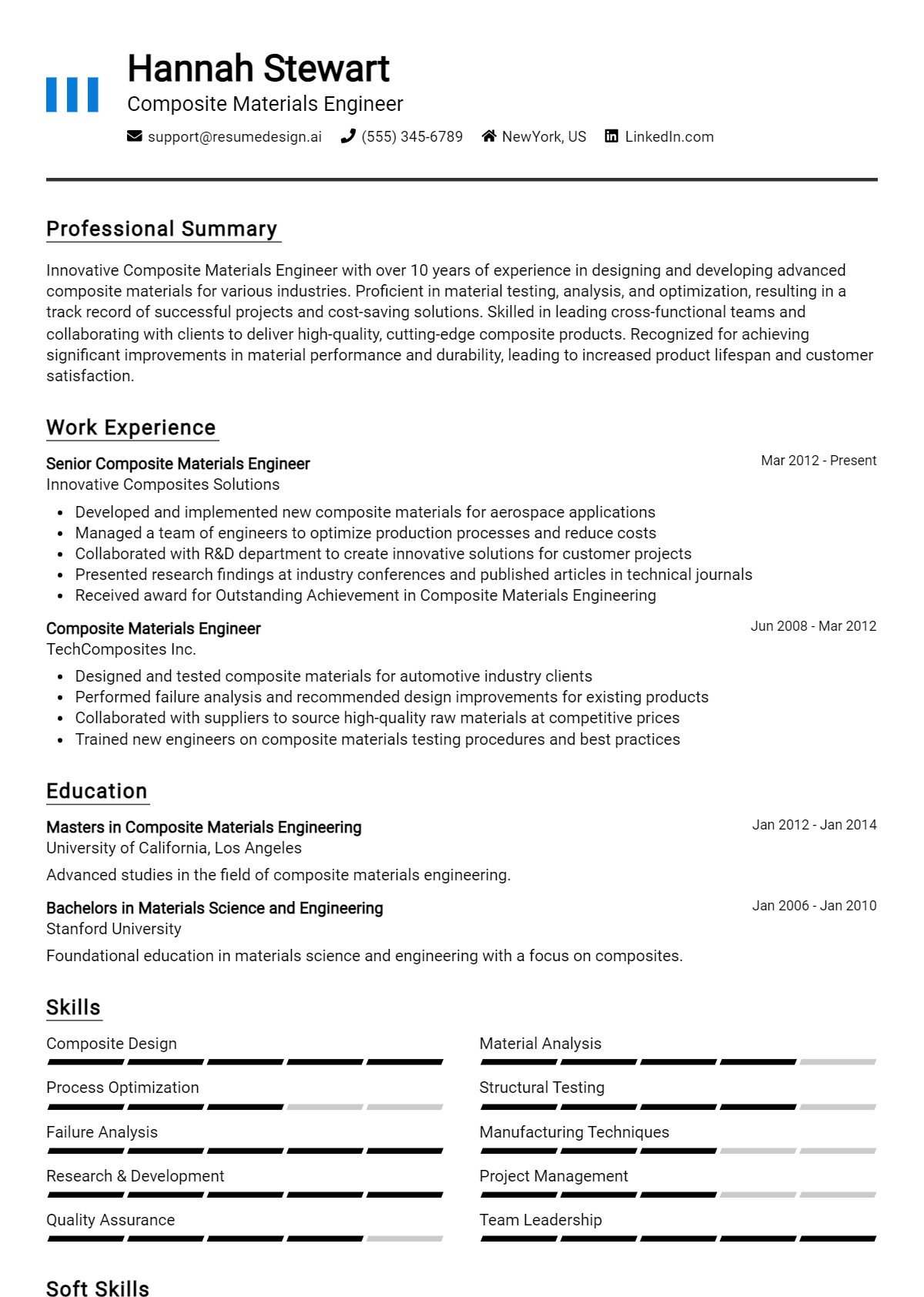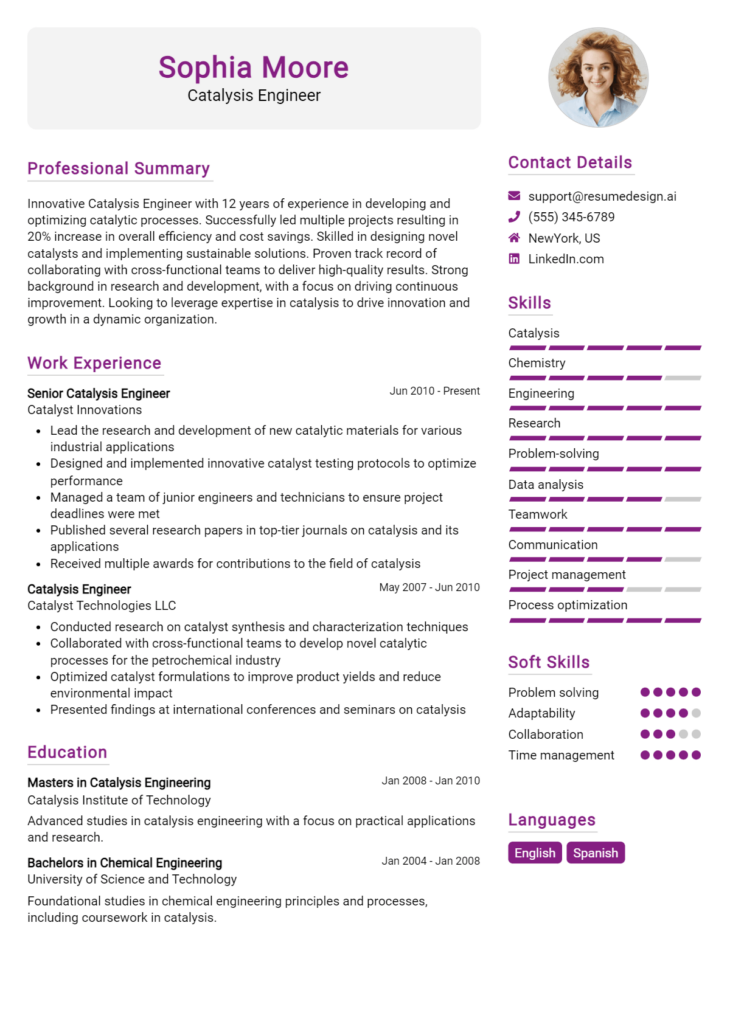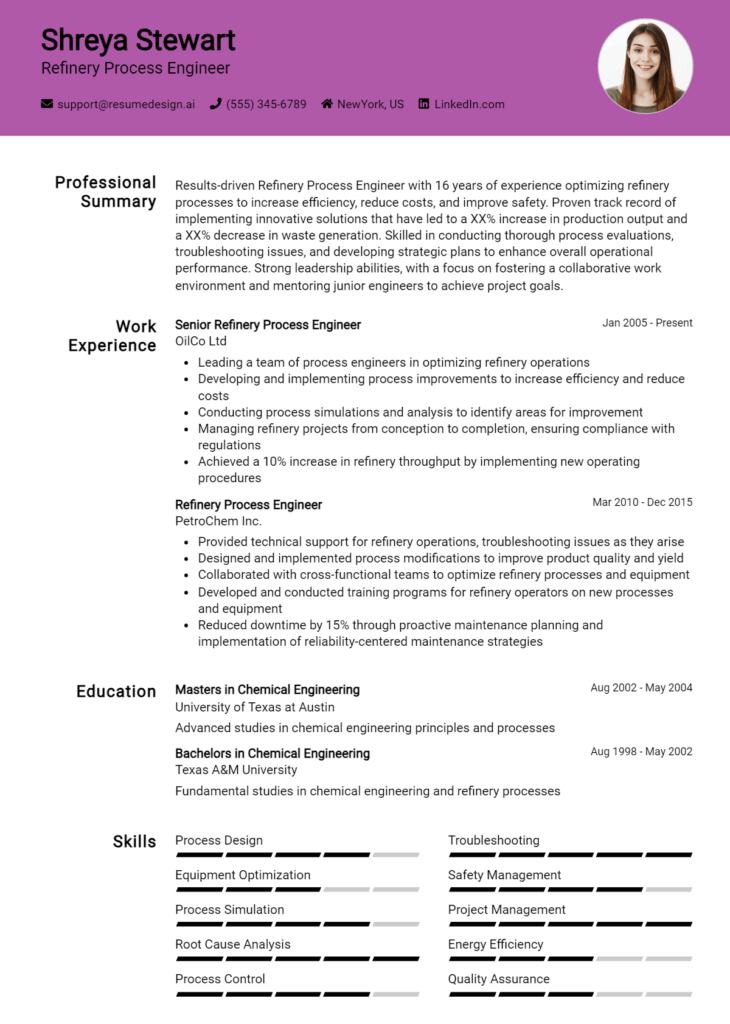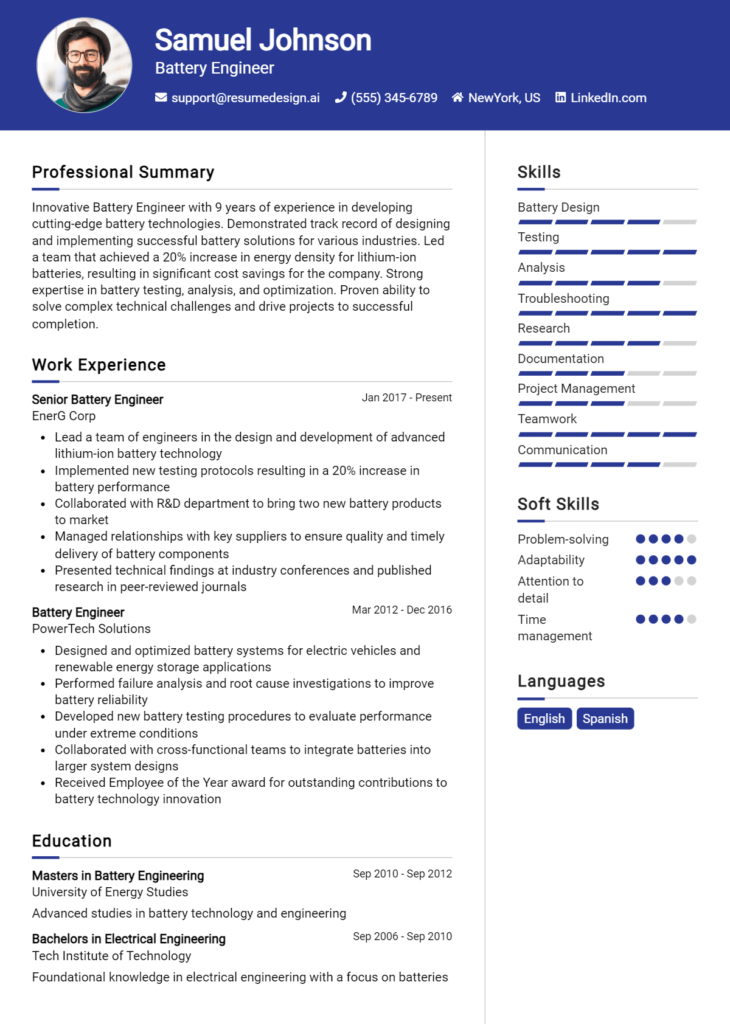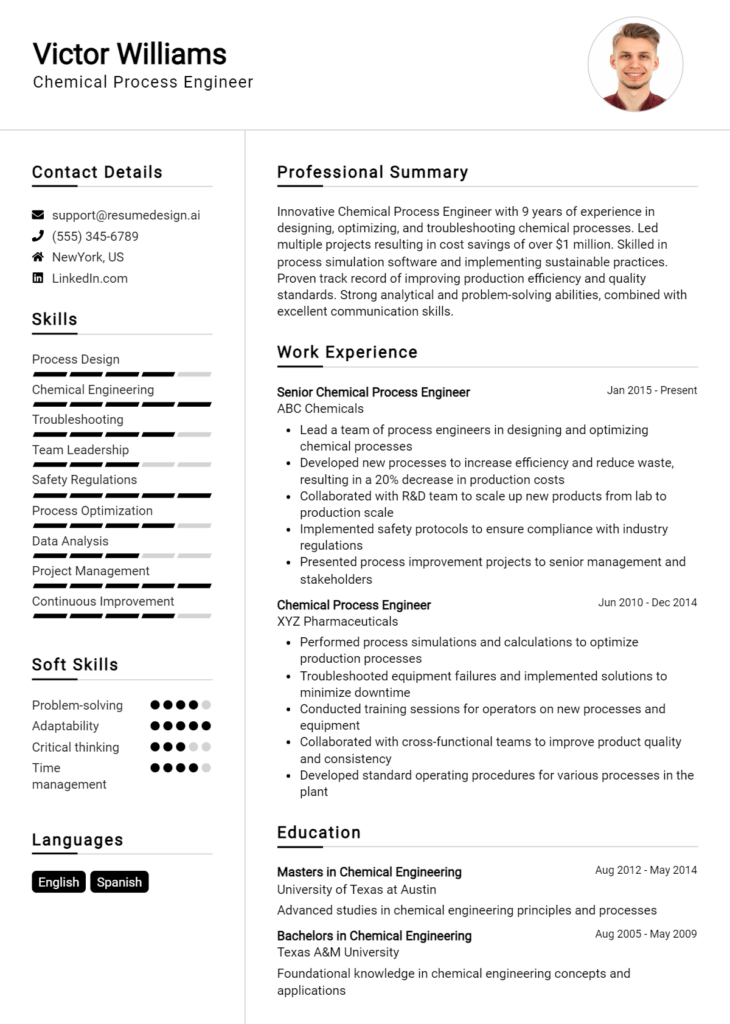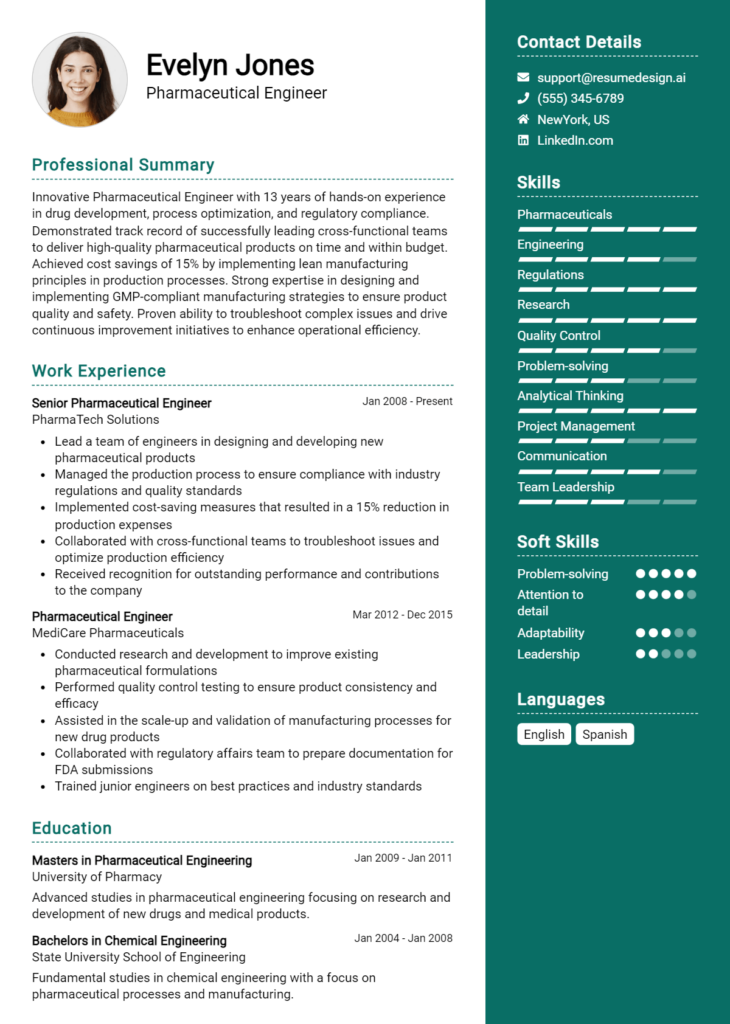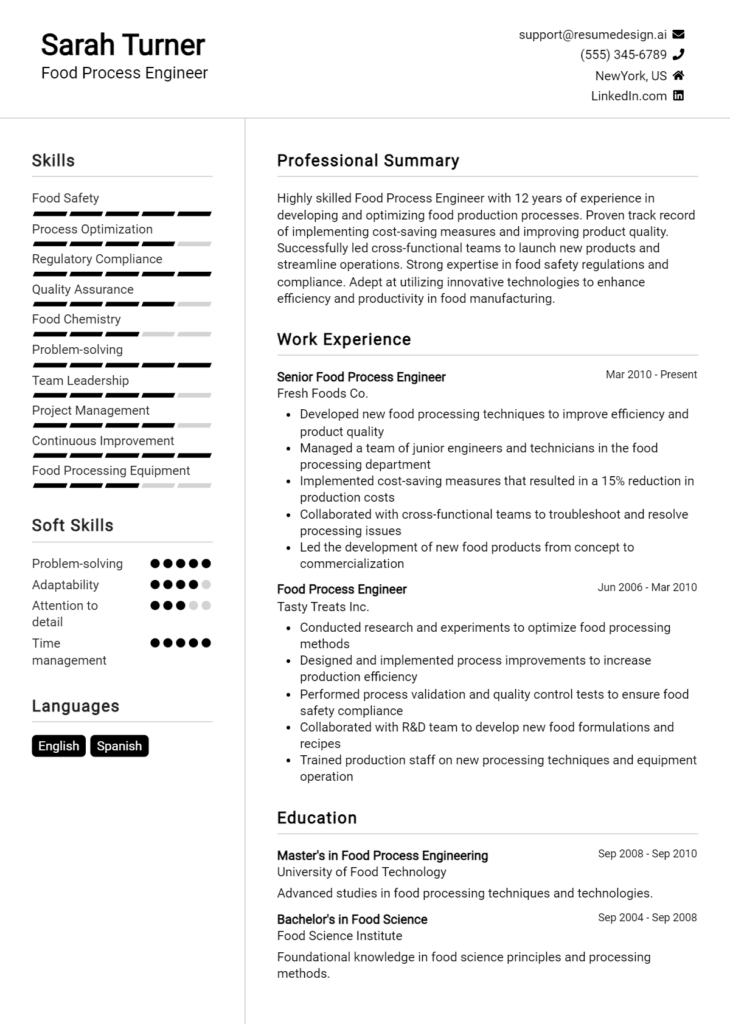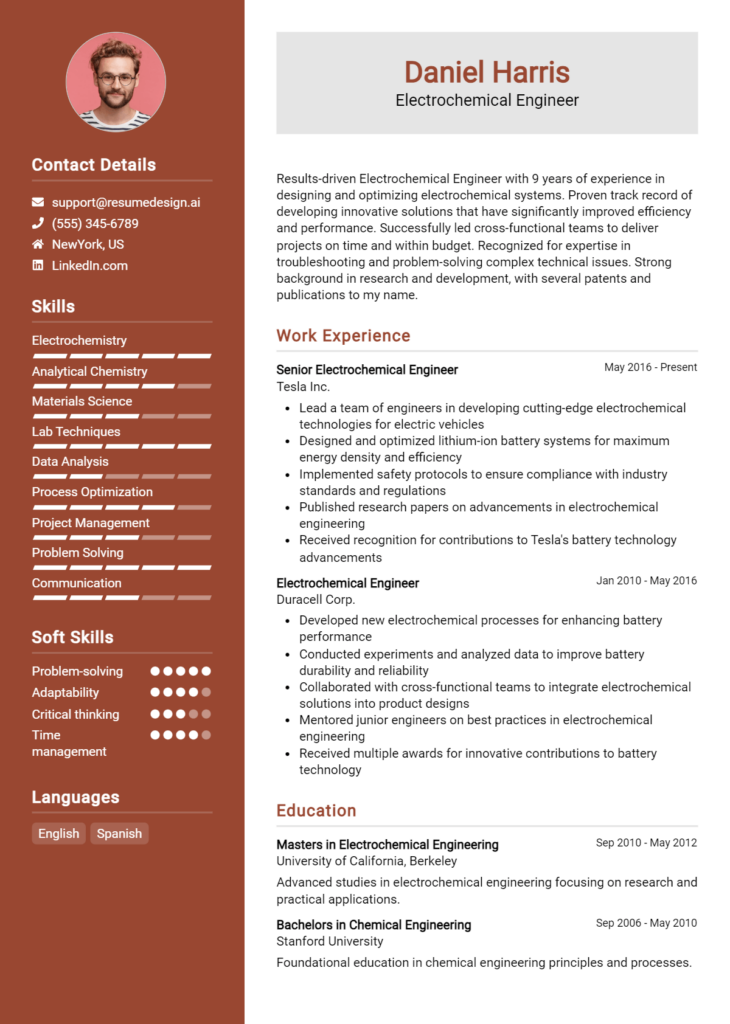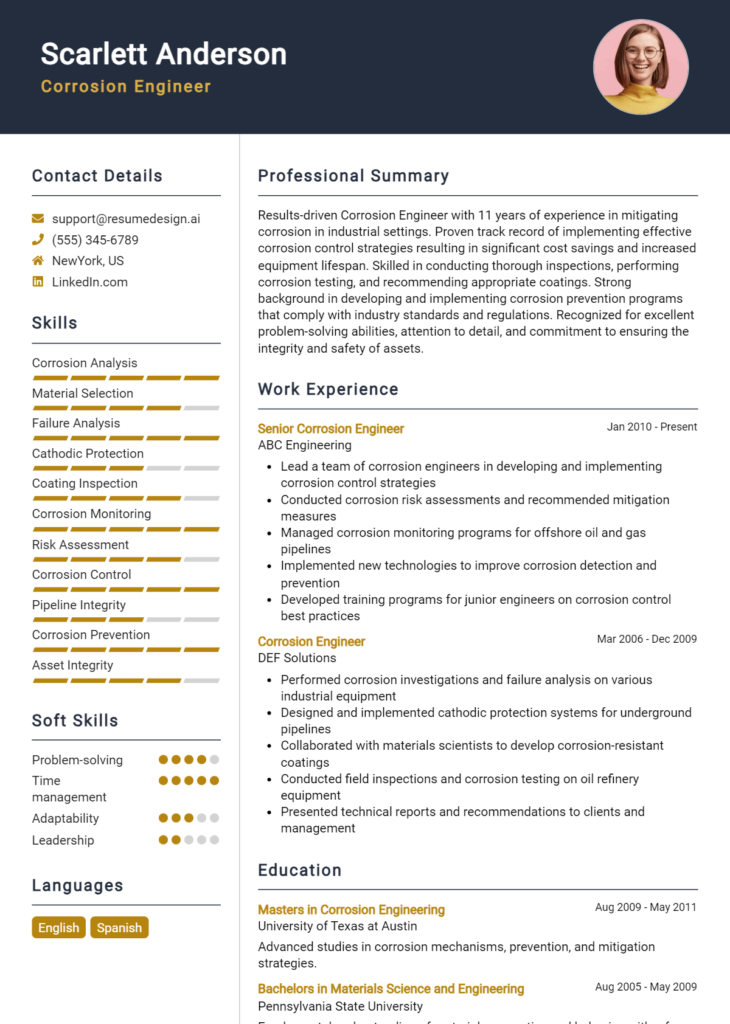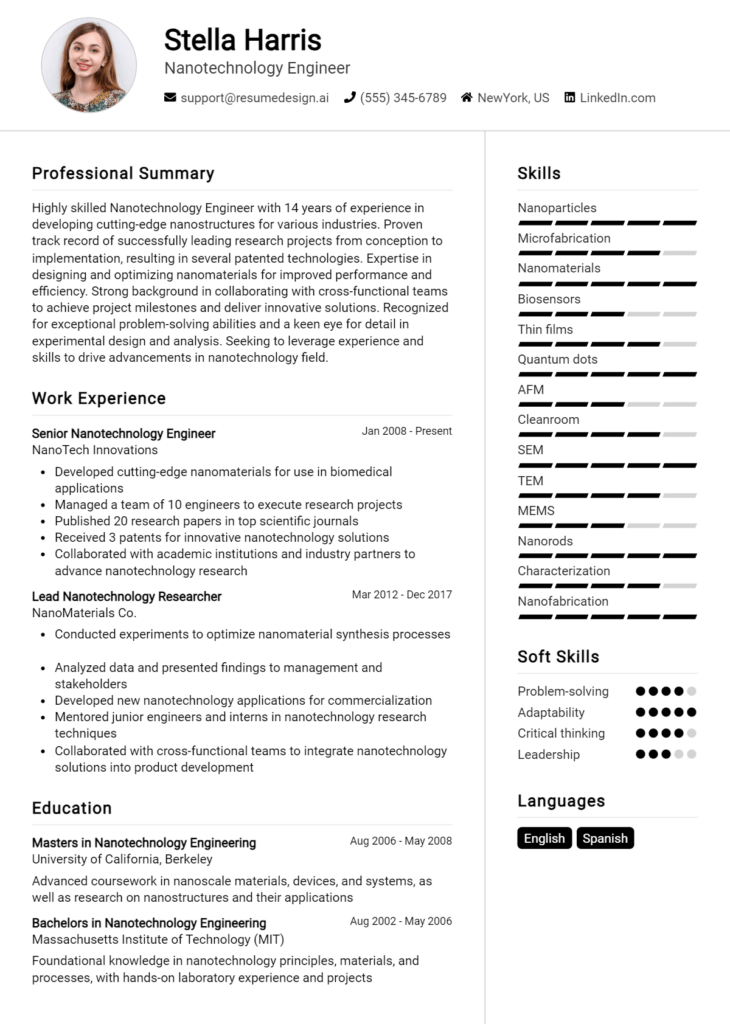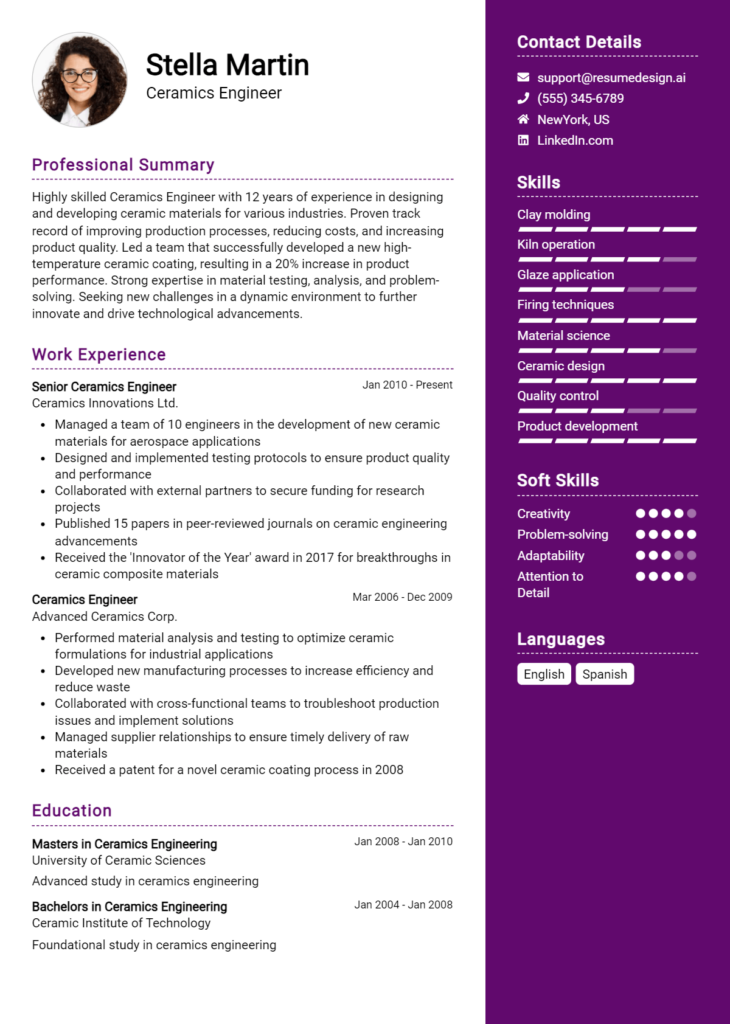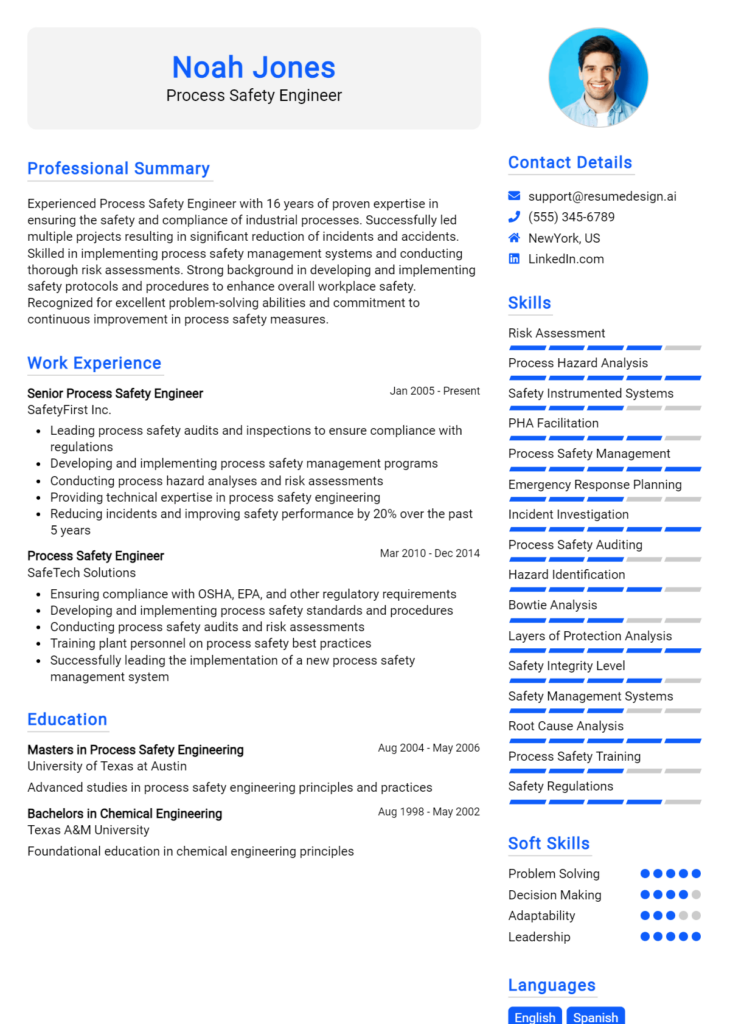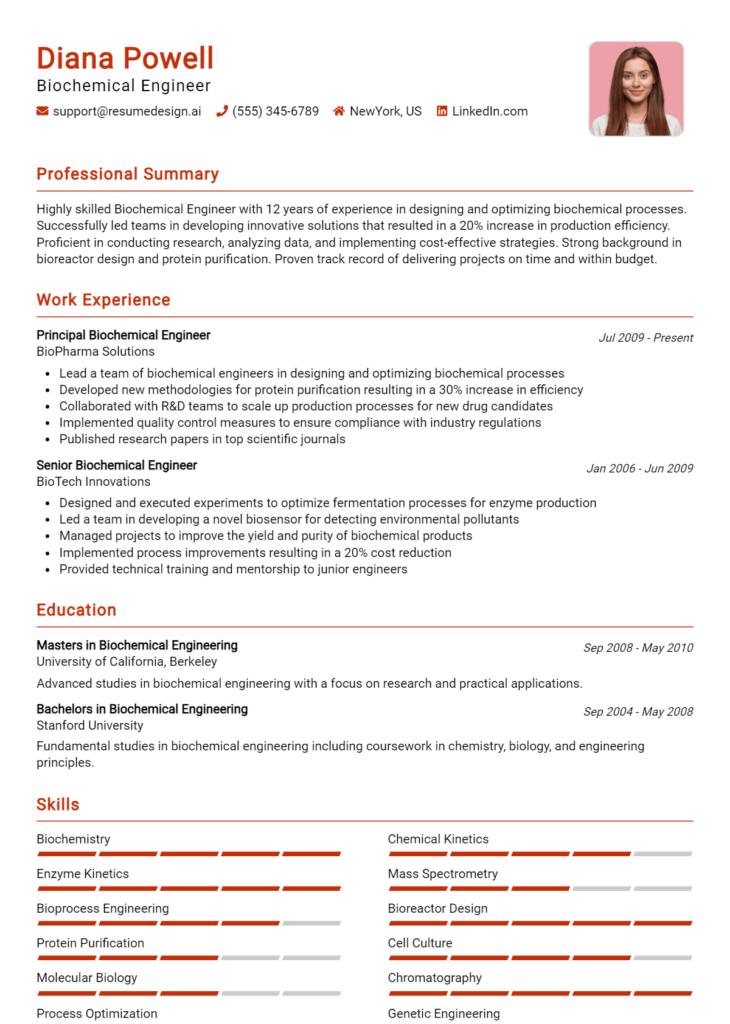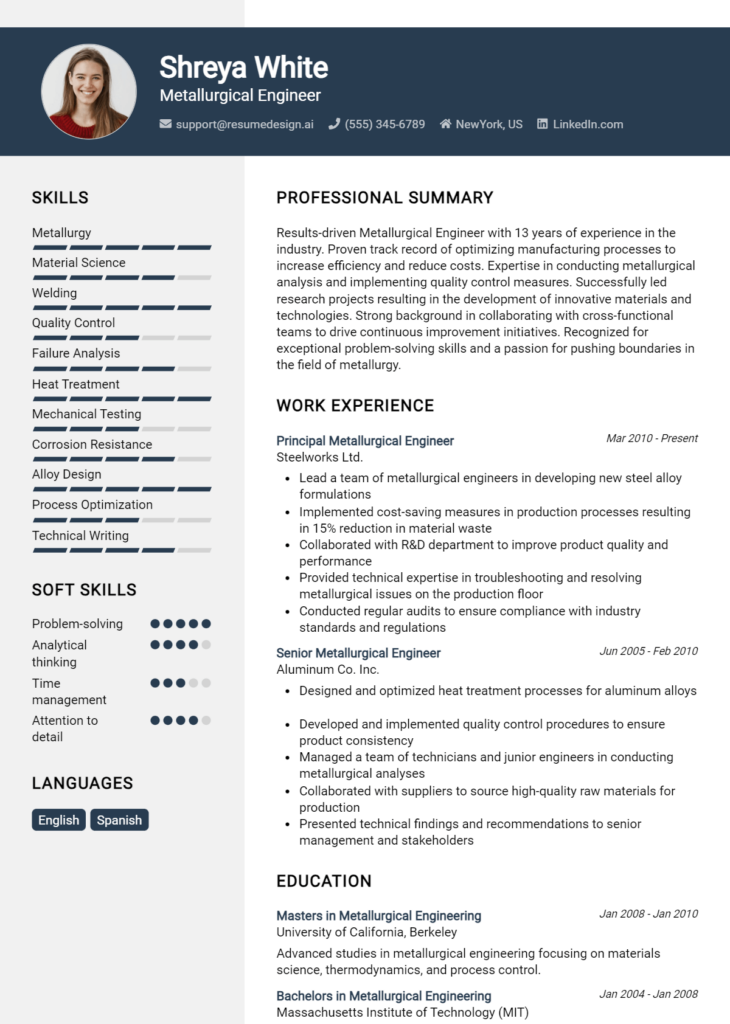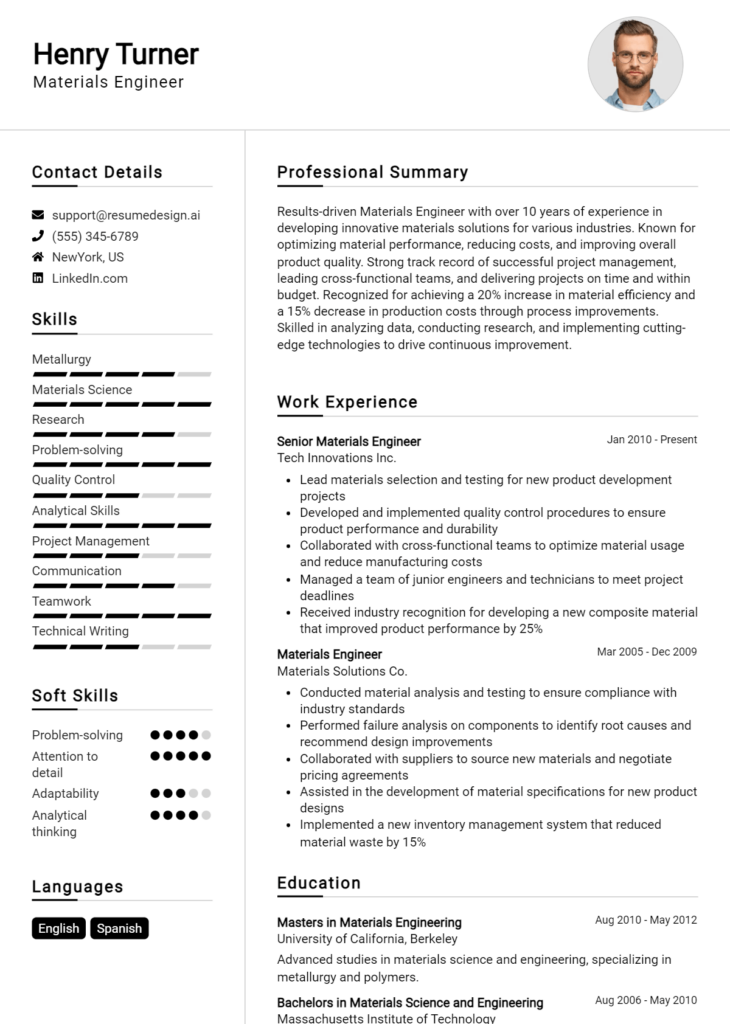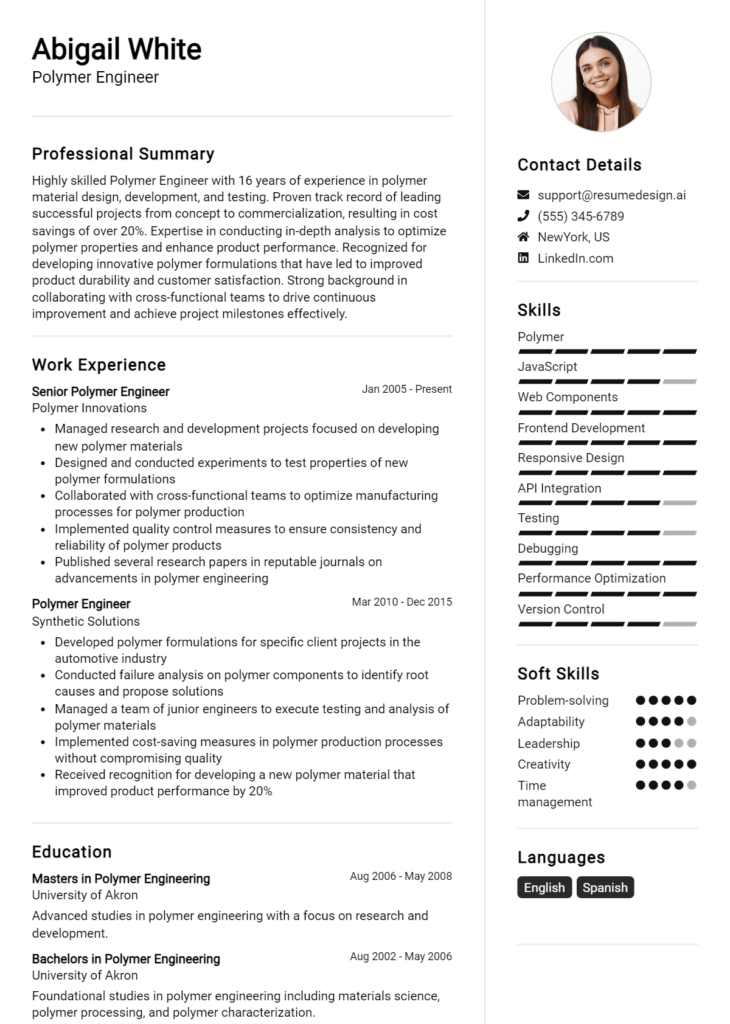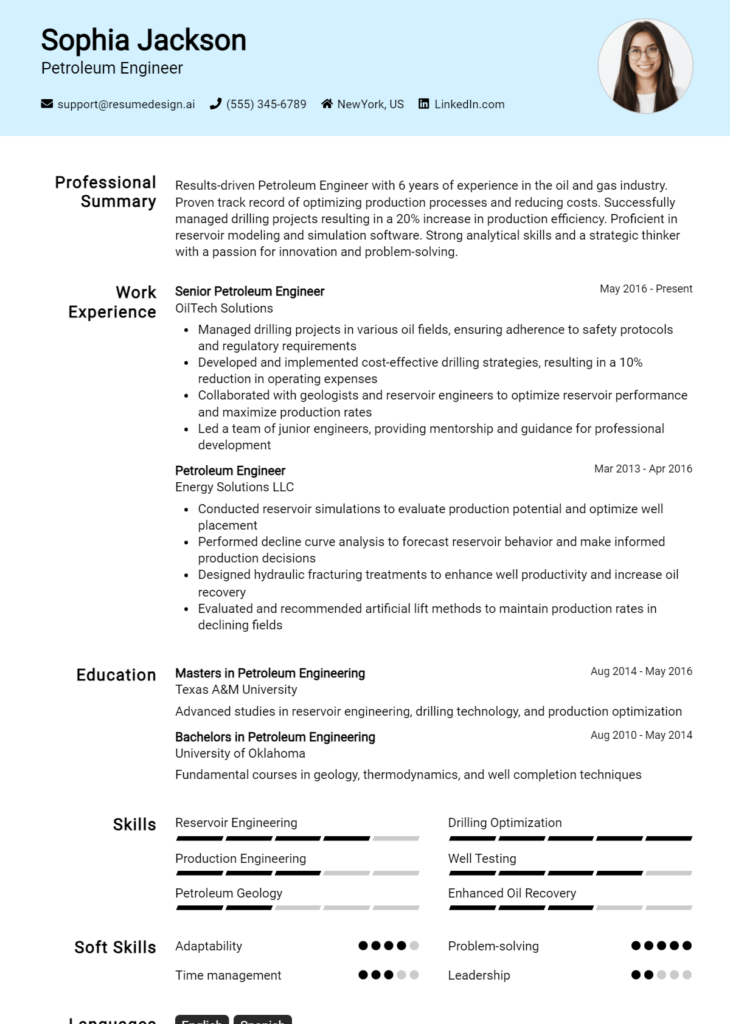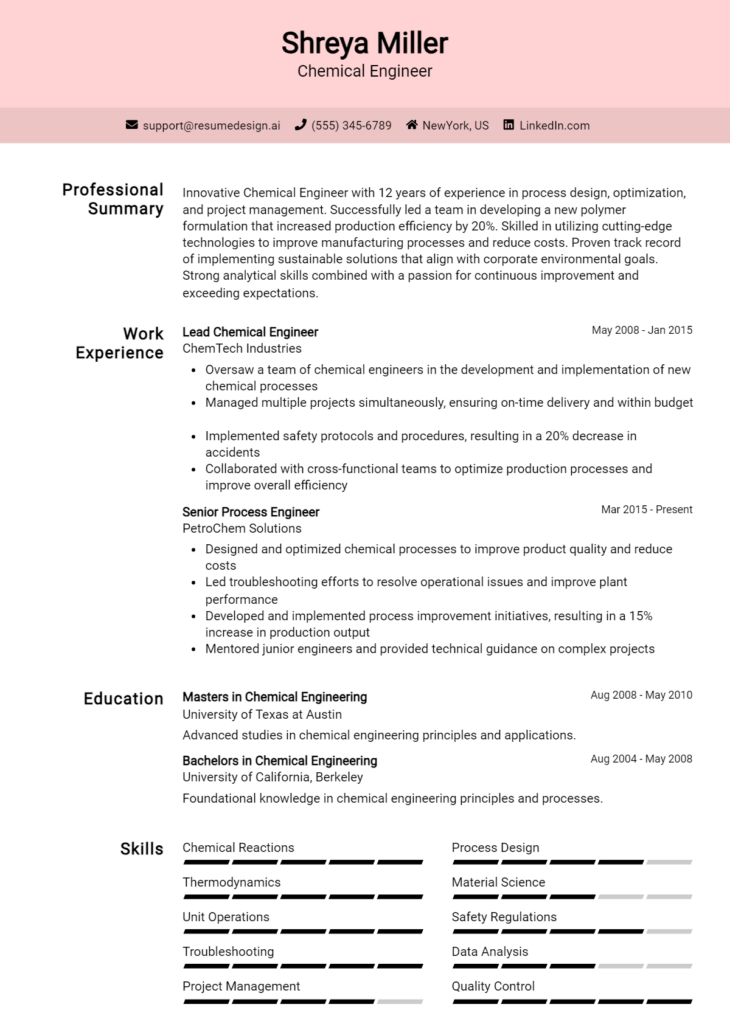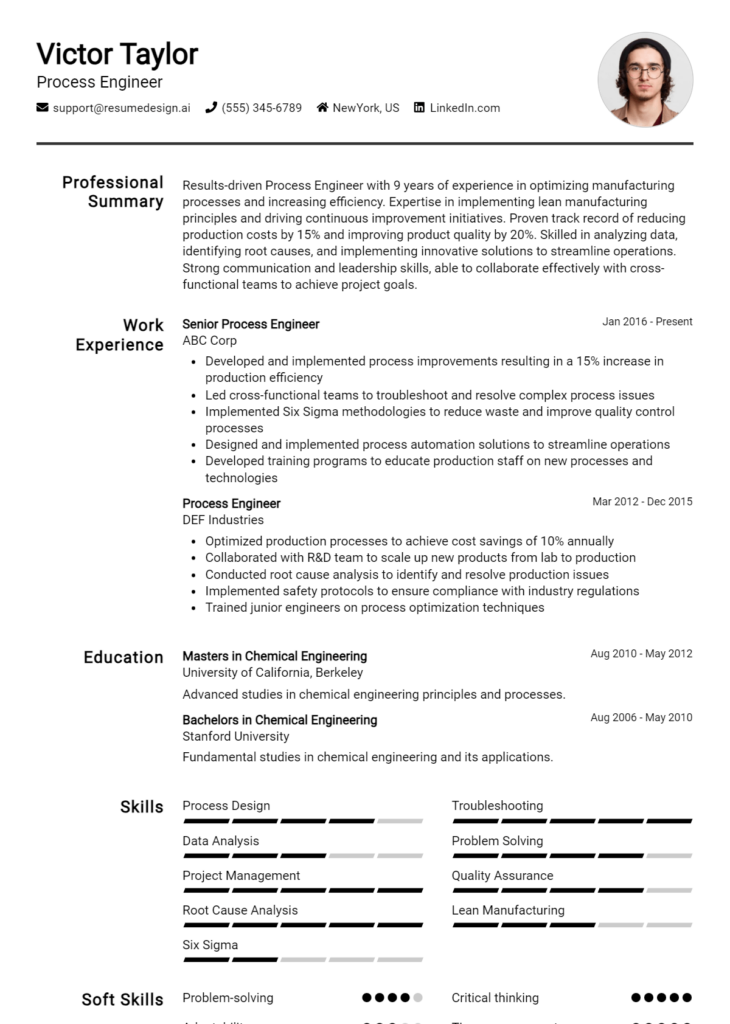Composite Materials Engineer Core Responsibilities
A Composite Materials Engineer plays a crucial role in designing, testing, and implementing composite materials for various applications, bridging engineering, manufacturing, and quality assurance departments. They require strong technical expertise in material properties, operational knowledge for manufacturing processes, and exceptional problem-solving skills to address challenges in performance and durability. These competencies are vital in aligning the organization's objectives with product innovation and efficiency. A well-structured resume can effectively highlight these qualifications, ensuring candidates stand out in this specialized field.
Common Responsibilities Listed on Composite Materials Engineer Resume
- Design and analyze composite materials for structural applications.
- Conduct material testing to evaluate performance and durability.
- Collaborate with cross-functional teams, including manufacturing and design.
- Develop and implement manufacturing processes for composites.
- Perform failure analysis and troubleshooting of composite structures.
- Ensure compliance with industry standards and regulations.
- Prepare technical documentation and reports on material properties.
- Evaluate the cost-effectiveness of composite materials and processes.
- Stay updated on advancements in composite technology and materials.
- Train and mentor junior engineers in composite material applications.
- Assist in project management and timeline development for material projects.
High-Level Resume Tips for Composite Materials Engineer Professionals
In the competitive field of composite materials engineering, a well-crafted resume is crucial for making a strong first impression on potential employers. Your resume serves as the initial representation of your professional identity, showcasing not only your technical skills but also your unique achievements in the industry. It must effectively communicate your expertise, experience, and the value you can bring to an organization. In this guide, we will provide practical and actionable resume tips specifically tailored for Composite Materials Engineer professionals, helping you to stand out in a crowded job market.
Top Resume Tips for Composite Materials Engineer Professionals
- Tailor your resume to align with the specific job description, emphasizing relevant skills and experiences that match the employer's needs.
- Highlight your education and certifications in composite materials, materials science, or related fields to establish your technical foundation.
- Include a summary statement at the top of your resume that encapsulates your experience, skills, and career goals in composite materials engineering.
- Showcase relevant work experience, focusing on roles that involved the design, testing, or manufacturing of composite materials.
- Quantify your achievements with specific metrics, such as percentage improvements in material performance or cost savings you achieved through innovative solutions.
- Emphasize industry-specific software proficiency, such as CAD tools, finite element analysis (FEA), or other simulation software used in the design of composite materials.
- Incorporate keywords from the job posting throughout your resume to help your application get past applicant tracking systems (ATS).
- Highlight any collaboration with cross-functional teams, showcasing your ability to work in multidisciplinary environments.
- Keep the design of your resume clean and professional, ensuring easy readability and a logical flow of information.
By implementing these tips, you can significantly enhance your resume and increase your chances of landing a job in the Composite Materials Engineer field. A polished and targeted resume not only reflects your qualifications but also demonstrates your commitment to your career, making you a more appealing candidate to potential employers.
Why Resume Headlines & Titles are Important for Composite Materials Engineer
In the competitive field of composite materials engineering, the importance of a well-crafted resume headline or title cannot be overstated. A strong headline serves as the first point of contact for hiring managers, instantly grabbing their attention and summarizing a candidate's key qualifications in a single impactful phrase. Given the technical nature of the role, it is crucial that the headline is not only concise but also relevant and directly related to the specific job being applied for. An effective resume headline sets the tone for the entire document, making it easier for employers to quickly assess the candidate's fit for the position.
Best Practices for Crafting Resume Headlines for Composite Materials Engineer
- Keep it concise: Aim for one impactful sentence that captures your expertise.
- Be role-specific: Clearly indicate your specialization in composite materials engineering.
- Highlight key skills: Include specific skills or technologies relevant to the job description.
- Use action-oriented language: Start with strong verbs to convey a sense of initiative and capability.
- Incorporate quantifiable achievements: If possible, mention metrics or accomplishments that demonstrate success.
- Tailor to the job: Customize your headline for each application to align with the employer's needs.
- Avoid jargon: Use clear and straightforward language that can be understood by a broad audience.
- Showcase certifications or education: Mention relevant qualifications that enhance your candidacy.
Example Resume Headlines for Composite Materials Engineer
Strong Resume Headlines
Innovative Composite Materials Engineer with 10+ Years of Experience in Aerospace Applications
Expert in Advanced Composite Design and Manufacturing Processes with Proven Track Record
Results-Driven Composite Engineer Specializing in Lightweight Structures and Sustainability
Composite Materials Specialist with Extensive Knowledge of Testing and Quality Assurance
Weak Resume Headlines
Engineer Looking for Opportunities
Experienced Professional in Engineering
Composite Materials Engineer Seeking a Job
The strong headlines are effective because they immediately convey the candidate's specific expertise and experience in composite materials engineering, making a clear connection to the job at hand. They use action-oriented language and highlight valuable skills and accomplishments that are attractive to hiring managers. On the other hand, the weak headlines fail to impress because they are vague and non-specific, lacking any detail that would differentiate the candidate from others. They do not communicate relevant qualifications or the unique value that the candidate brings to the table, which makes it difficult for employers to see potential fit for the role.
Writing an Exceptional Composite Materials Engineer Resume Summary
A well-crafted resume summary is crucial for a Composite Materials Engineer, as it serves as the first impression to potential employers. This brief yet impactful section quickly captures the attention of hiring managers by succinctly highlighting key skills, relevant experience, and significant accomplishments that align with the specific demands of the job role. A strong summary not only showcases the candidate's technical expertise but also demonstrates their ability to contribute to the organization, making it essential to tailor this section for each unique job application.
Best Practices for Writing a Composite Materials Engineer Resume Summary
- Quantify achievements: Use numbers to demonstrate the impact of your work, such as project budgets or percentage improvements.
- Focus on relevant skills: Highlight technical skills specific to composite materials and engineering principles that are pertinent to the job.
- Tailor your summary: Customize your summary to match the job description and the company’s needs, reflecting the required competencies.
- Use strong action verbs: Start sentences with dynamic verbs to convey confidence and proactivity.
- Keep it concise: Aim for 2-4 sentences that pack a punch without overwhelming the reader.
- Showcase certifications: Mention any relevant certifications or specialized training that enhance your qualifications.
- Highlight soft skills: Include interpersonal or problem-solving skills that are valuable in collaborative environments.
- Stay professional: Maintain a formal tone and avoid jargon that may not be universally understood.
Example Composite Materials Engineer Resume Summaries
Strong Resume Summaries
Results-driven Composite Materials Engineer with over 8 years of experience in developing lightweight, high-performance materials for aerospace applications. Successfully led a team that reduced material costs by 30% while improving product durability by 25% through innovative design and testing methodologies.
Dedicated Composite Materials Engineer with a proven track record in the automotive industry, specializing in carbon fiber composites. Delivered a project that enhanced vehicle performance by 15% and reduced weight by 10%, leveraging advanced simulation software and thorough material analysis.
Innovative Composite Materials Engineer with expertise in thermoset and thermoplastic composites, contributing to more than 10 successful product launches. Spearheaded R&D initiatives that resulted in a 20% increase in production efficiency and a 15% reduction in waste, aligning with sustainability goals.
Weak Resume Summaries
Composite Materials Engineer looking for a challenging role in a dynamic company. Experienced in working with various materials.
Skilled engineer with a background in composites. I want to contribute to exciting projects and grow professionally.
The strong resume summaries are considered effective because they provide specific details about achievements, quantify results, and demonstrate direct relevance to the Composite Materials Engineer role. They clearly articulate the candidate's value and expertise in the field. Conversely, the weak summaries lack specificity and quantifiable outcomes, making them generic and less compelling for hiring managers who seek impactful candidates.
Work Experience Section for Composite Materials Engineer Resume
The work experience section of a Composite Materials Engineer resume is pivotal, as it provides a comprehensive overview of the candidate's professional journey and technical expertise in this specialized field. This section not only highlights the candidate's proficiency in composite materials but also demonstrates their ability to manage teams, collaborate effectively, and deliver high-quality products that meet industry standards. Quantifying achievements, such as cost savings, efficiency improvements, or project timelines, is crucial in showcasing the candidate's impact and aligning their experience with the expectations of potential employers.
Best Practices for Composite Materials Engineer Work Experience
- Clearly articulate technical skills relevant to composite materials, such as manufacturing processes, material testing, and design methodologies.
- Quantify achievements wherever possible, such as percentage improvements in material strength or reductions in production costs.
- Highlight leadership roles or team management experiences to demonstrate your ability to guide projects and mentor others.
- Include specific project examples that showcase your problem-solving abilities and innovative approaches in composite materials engineering.
- Align your experiences with industry standards and best practices to show familiarity with current technologies and methods.
- Emphasize collaboration by mentioning cross-functional teams or partnerships that contributed to project success.
- Use action verbs to convey a sense of initiative and results-driven performance in your roles.
- Be concise and focused, ensuring that each bullet point communicates a distinct and relevant aspect of your experience.
Example Work Experiences for Composite Materials Engineer
Strong Experiences
- Led a team of 5 engineers in the successful development of a new lightweight composite material that improved fuel efficiency by 15% in automotive applications.
- Implemented a quality control protocol that reduced scrap material by 30%, resulting in annual savings of $100,000.
- Collaborated with cross-functional teams to design and manufacture a composite structure for aerospace, achieving a 20% reduction in weight while maintaining structural integrity.
- Conducted extensive testing and analysis of composite materials, leading to the approval of three new products that increased market share by 10%.
Weak Experiences
- Worked on various projects related to composite materials.
- Assisted in the engineering process of composite materials without specific achievements.
- Participated in team meetings and discussed composite materials.
- Helped with material testing and data collection.
The examples labeled as strong experiences are considered effective because they provide specific details and quantifiable outcomes, showcasing the candidate's technical expertise and leadership abilities. They demonstrate a clear impact on business results and align well with industry needs. In contrast, the weak experiences lack specificity and measurable achievements, making them less compelling to prospective employers. These vague statements fail to highlight the candidate's contributions and do not convey a strong sense of expertise or initiative in the field of composite materials engineering.
Education and Certifications Section for Composite Materials Engineer Resume
The education and certifications section of a Composite Materials Engineer resume plays a crucial role in demonstrating the candidate's academic qualifications, industry-specific certifications, and commitment to continuous professional development. This section allows candidates to showcase their foundational knowledge, specialized skills, and relevant coursework that align with the demands of the role. By including pertinent certifications and any specialized training, candidates can significantly enhance their credibility and demonstrate their readiness to contribute effectively in the field of composite materials engineering.
Best Practices for Composite Materials Engineer Education and Certifications
- Include relevant degrees in engineering, materials science, or a related field.
- List industry-recognized certifications, such as those from the American Society for Testing and Materials (ASTM) or the Society for the Advancement of Material and Process Engineering (SAMPE).
- Highlight specialized training or workshops that pertain to composite materials and their applications.
- Provide a concise summary of relevant coursework that strengthens your qualifications.
- Ensure all listed qualifications are up-to-date and reflect current industry standards.
- Use clear formatting to differentiate between degrees, certifications, and coursework for readability.
- Consider including any honors or awards received during your educational journey.
- Tailor the education and certifications section to align with the specific job requirements listed in the job description.
Example Education and Certifications for Composite Materials Engineer
Strong Examples
- Bachelor of Science in Materials Engineering, University of California, Berkeley, 2020
- Certified Composite Technician (CCT), National Institute for Certification in Engineering Technologies (NICET), 2021
- Master's Coursework: Advanced Composite Materials, Structural Analysis of Composite Structures, Michigan State University, 2021
- Professional Development Course: Introduction to Composite Manufacturing Processes, Composites World, 2022
Weak Examples
- Bachelor of Arts in English Literature, State University, 2018
- Certification in Basic Computer Skills, Online Learning Platform, 2020
- High School Diploma, Local High School, Graduated 2015
- Outdated Certification in Traditional Material Testing, 2015
The strong examples are considered effective because they directly relate to the field of composite materials engineering, showcasing relevant degrees, recognized certifications, and coursework that reflects the candidate's expertise and commitment to the profession. In contrast, the weak examples highlight qualifications that are either irrelevant to the job role or outdated, failing to demonstrate the technical knowledge and skills necessary for a successful career in composite materials engineering.
Top Skills & Keywords for Composite Materials Engineer Resume
In the competitive field of composite materials engineering, showcasing the right skills on your resume is vital for standing out to potential employers. A well-crafted resume not only highlights your technical knowledge and hands-on experience but also demonstrates your ability to collaborate, solve problems, and adapt to new technologies. By emphasizing both hard and soft skills, you can present a comprehensive picture of your capabilities, ensuring that you align with the expectations of hiring managers in this specialized industry. For those interested in enhancing their resumes, it’s crucial to understand which skills will resonate most with recruiters.
Top Hard & Soft Skills for Composite Materials Engineer
Soft Skills
- Problem-solving
- Critical thinking
- Team collaboration
- Communication skills
- Attention to detail
- Time management
- Adaptability
- Creativity
- Project management
- Leadership
Hard Skills
- Composite material design
- Finite element analysis (FEA)
- Materials characterization
- Manufacturing processes (e.g., resin transfer molding)
- Quality assurance and control
- CAD software proficiency (e.g., AutoCAD, SolidWorks)
- Knowledge of ASTM and ISO standards
- Testing and evaluation of materials
- Thermodynamics and material properties
- Data analysis and reporting
By incorporating these essential skills into your resume, you can effectively showcase your qualifications and increase your chances of landing an interview. Additionally, don't forget to detail your work experience in the context of these skills to provide concrete evidence of your expertise.
Stand Out with a Winning Composite Materials Engineer Cover Letter
Dear [Hiring Manager's Name],
I am writing to express my interest in the Composite Materials Engineer position at [Company Name] as advertised on [where you found the job listing]. With a Master's degree in Materials Science and over five years of hands-on experience in composite materials design and manufacturing, I am excited about the opportunity to contribute to your team's innovative projects. My background in both research and practical applications equips me with a unique perspective on developing advanced composite materials tailored for high-performance applications.
At my previous position with [Previous Company Name], I successfully led a project focused on optimizing the mechanical properties of carbon fiber reinforced polymers (CFRP) for aerospace applications. Through rigorous testing and analysis, I was able to enhance the material's strength-to-weight ratio by 15%, significantly improving the overall efficiency of the final product. My proficiency in utilizing software tools such as ANSYS and MATLAB for simulations has also allowed me to predict material behavior under various conditions, leading to more informed design choices and reduced development time.
Collaboration has been a cornerstone of my career, and I thrive in multidisciplinary teams where innovative ideas are cultivated. I am passionate about mentoring junior engineers and sharing knowledge about composite materials, which I believe fosters a culture of continuous improvement and innovation. I am particularly drawn to [Company Name] because of its commitment to sustainability and cutting-edge technology in composite engineering, and I am eager to contribute to projects that push the boundaries of what is possible.
Thank you for considering my application. I look forward to the opportunity to discuss how my skills and experiences align with the goals of your team. I am excited about the potential to be part of [Company Name] and to help drive advancements in composite materials engineering.
Sincerely,
[Your Name]
[Your Phone Number]
[Your Email Address]
Common Mistakes to Avoid in a Composite Materials Engineer Resume
When crafting a resume for a Composite Materials Engineer position, it’s crucial to present your skills and experiences effectively. However, many candidates fall into common pitfalls that can diminish their chances of landing an interview. Avoiding these mistakes will not only help highlight your qualifications but also ensure that recruiters see you as a strong candidate for the role. Here are some common mistakes to watch out for:
Generic Objective Statement: Using a one-size-fits-all objective statement can make your resume feel impersonal. Tailor your objective to reflect your specific interest in composite materials and the particular role you’re applying for.
Overloading with Technical Jargon: While technical terms are important, overusing them can alienate non-technical hiring managers. Balance technical language with clear explanations to ensure your achievements are understood by all readers.
Neglecting Projects and Achievements: Focusing solely on job duties instead of highlighting specific projects or achievements can downplay your contributions. Include quantifiable results, such as improvements in material performance or cost savings.
Inconsistent Formatting: Inconsistent fonts, bullet styles, or spacing can make your resume look unprofessional. Maintain uniform formatting throughout to create a polished and cohesive appearance.
Omitting Relevant Certifications: Certifications related to composite materials or engineering practices can set you apart from other candidates. Be sure to list all relevant certifications clearly to showcase your qualifications.
Lack of Keywords: Failing to include industry-specific keywords can hinder your resume’s visibility in Applicant Tracking Systems (ATS). Study the job description and incorporate relevant keywords to increase your chances of passing initial screenings.
Ignoring Soft Skills: Technical expertise is vital, but soft skills like teamwork, communication, and problem-solving are equally important. Highlighting these skills can demonstrate your ability to work effectively in collaborative environments.
Excessive Length: A resume that is too lengthy can overwhelm hiring managers. Aim to keep your resume concise, ideally one page, focusing on the most relevant experiences and skills that pertain to the Composite Materials Engineer role.
Conclusion
As a Composite Materials Engineer, your role is crucial in developing innovative materials that enhance product performance while reducing weight and costs. This article has highlighted the importance of having a strong educational background in materials science or engineering, as well as practical experience in designing, testing, and analyzing composite materials. We also discussed key skills that employers look for, including proficiency in software tools for modeling and analysis, excellent problem-solving abilities, and strong communication skills to collaborate effectively within multidisciplinary teams.
To ensure you stand out in this competitive field, it's essential to present your qualifications in the best possible light through your resume. Take a moment to review your Composite Materials Engineer resume to make sure it effectively showcases your skills, experience, and achievements.
To assist you in this process, consider utilizing resources like resume templates, which can help you create a visually appealing layout. You can also explore the resume builder for a step-by-step guide to crafting a professional resume tailored to your expertise. Additionally, reviewing resume examples can provide inspiration and insights into how to best articulate your experience. Lastly, don't forget to enhance your application with a strong cover letter using our cover letter templates.
By leveraging these tools, you can refine your resume and improve your chances of landing your desired position as a Composite Materials Engineer. Take action today and invest time in presenting your qualifications effectively!

